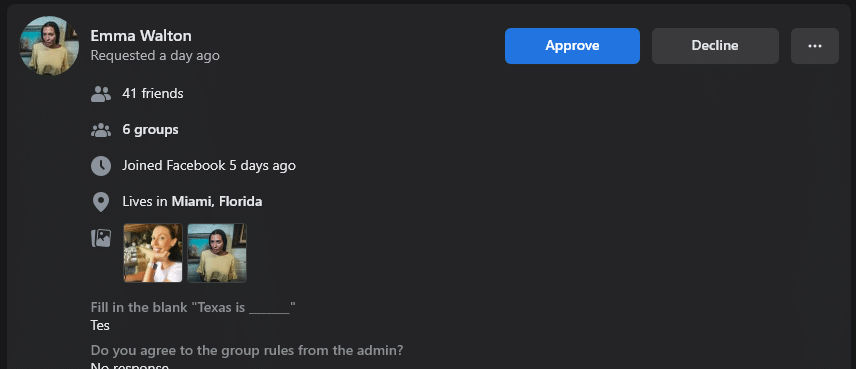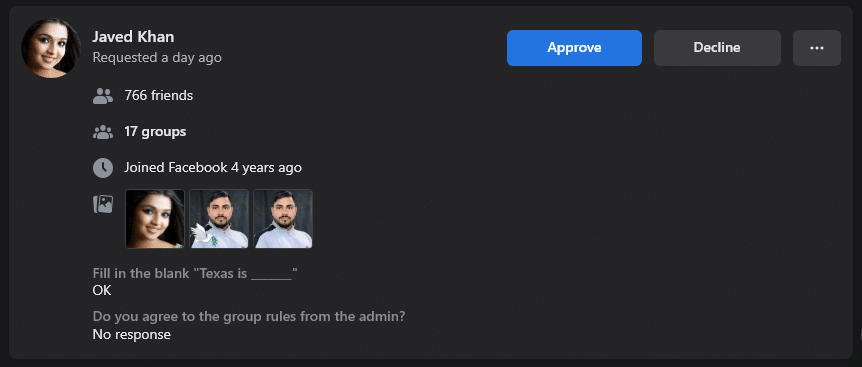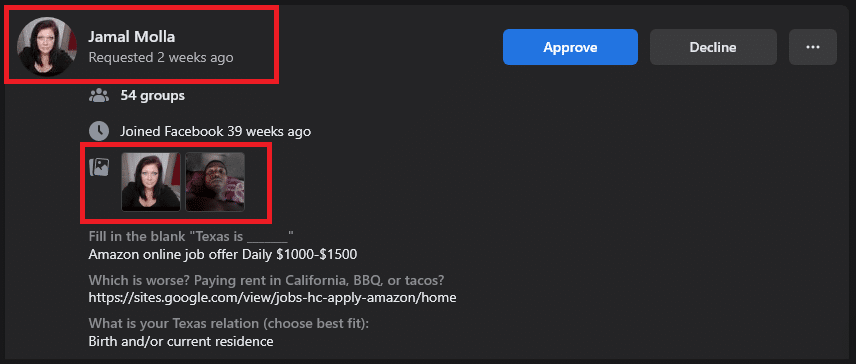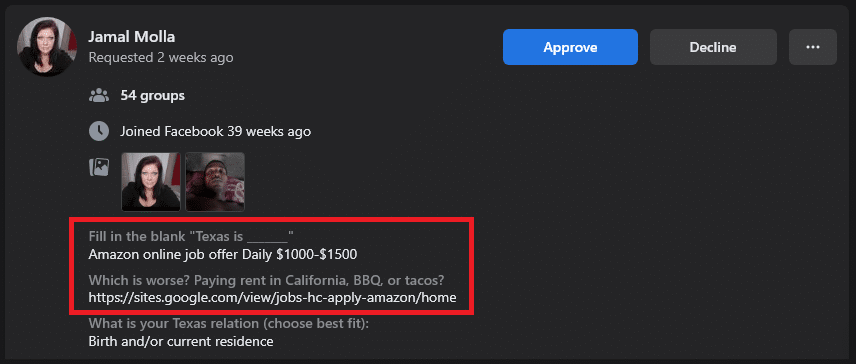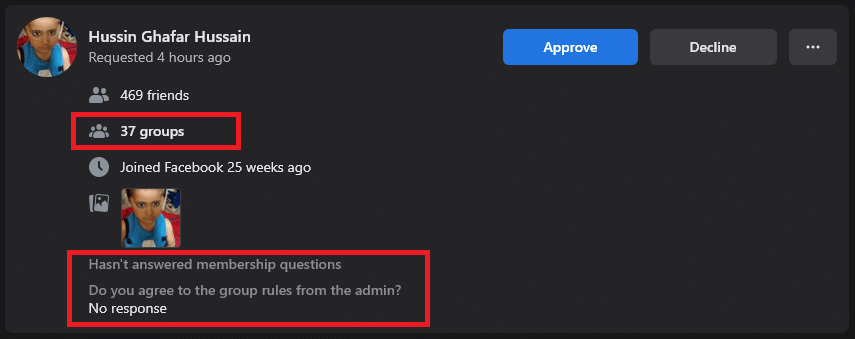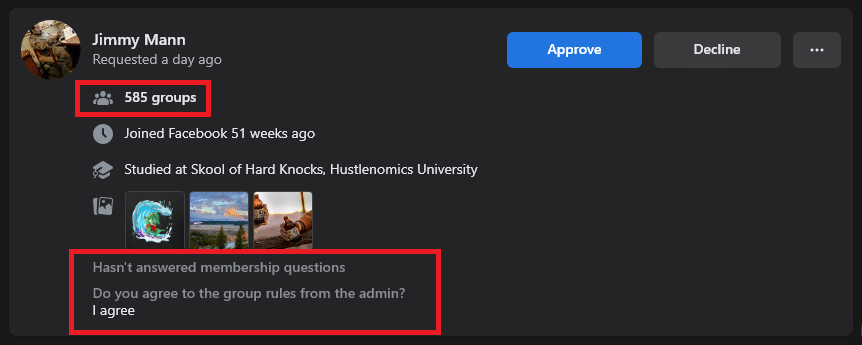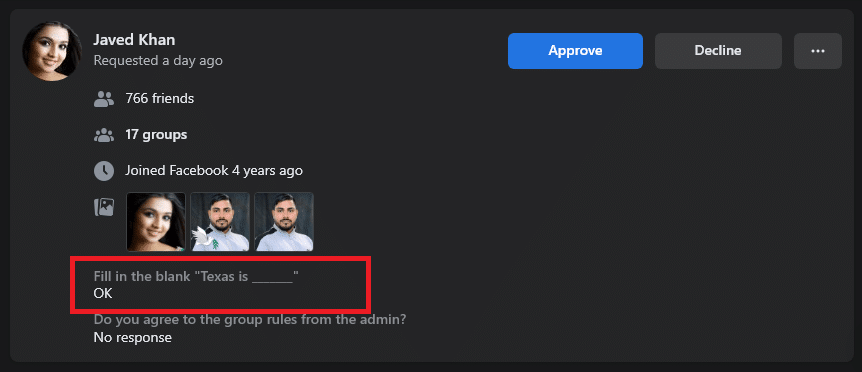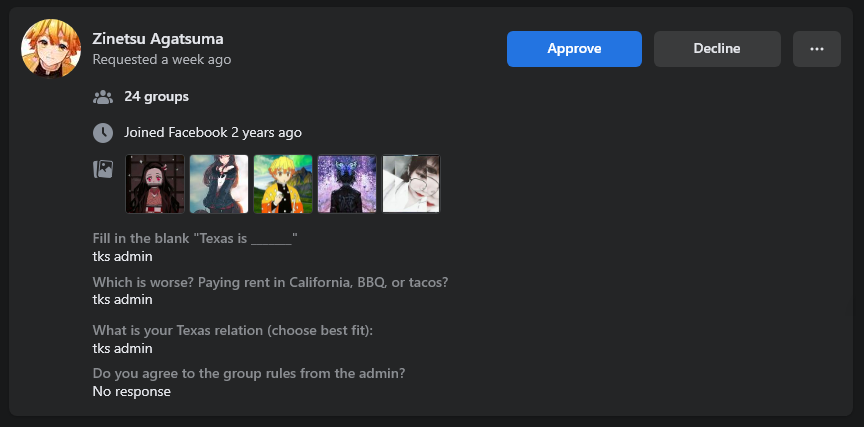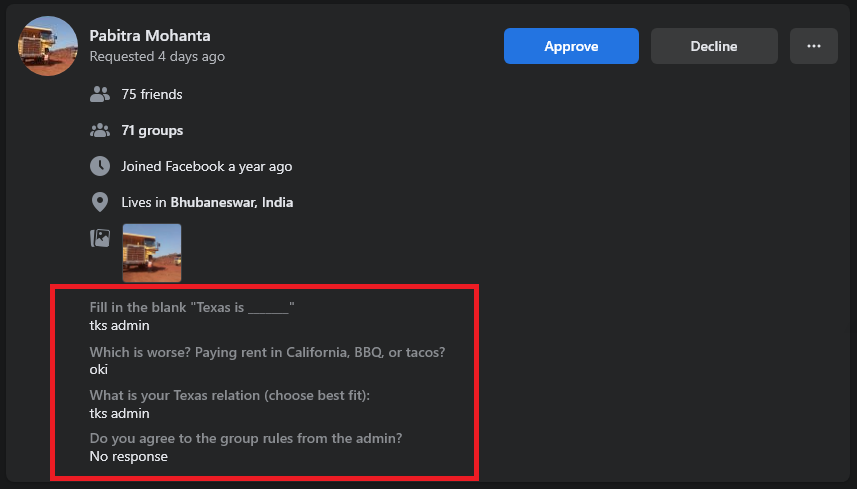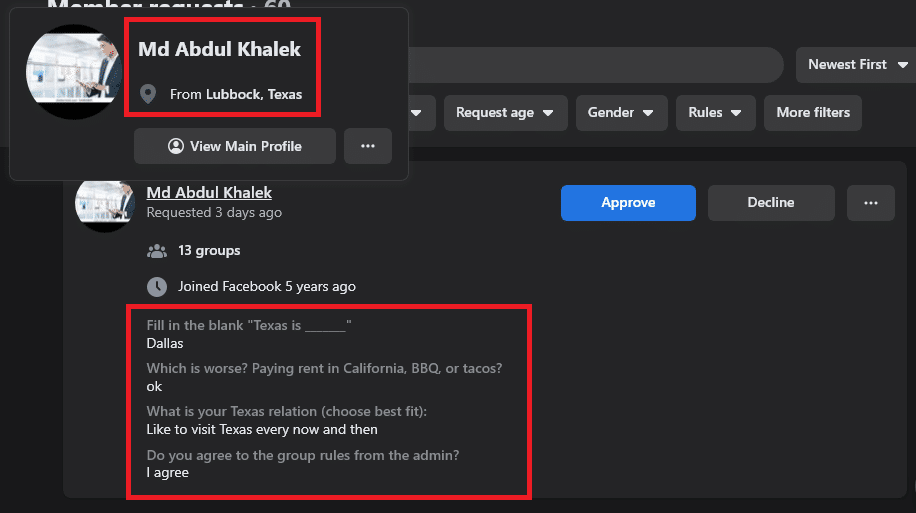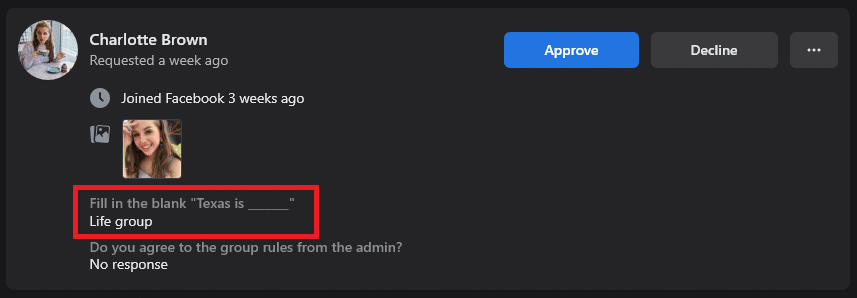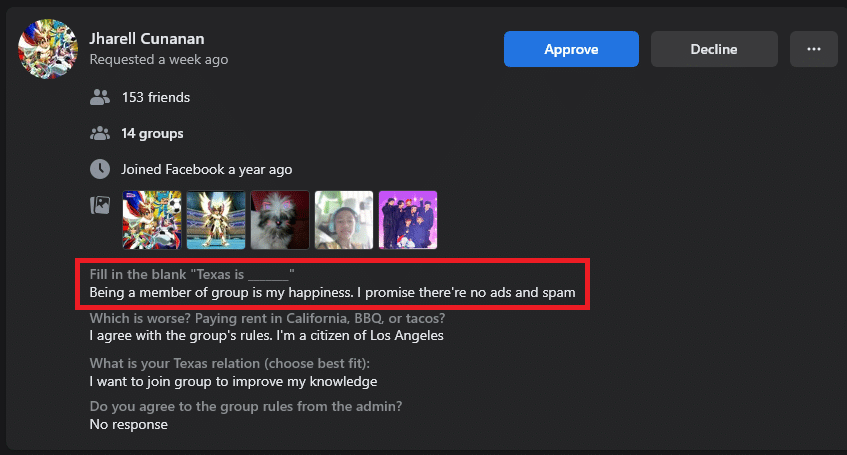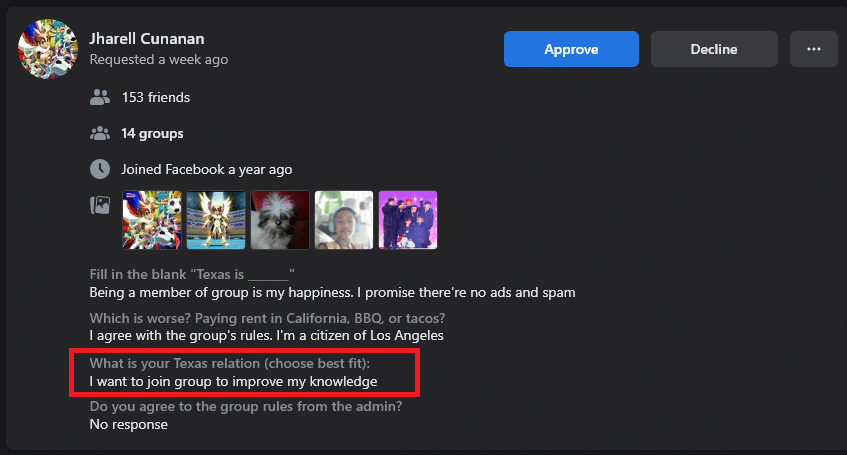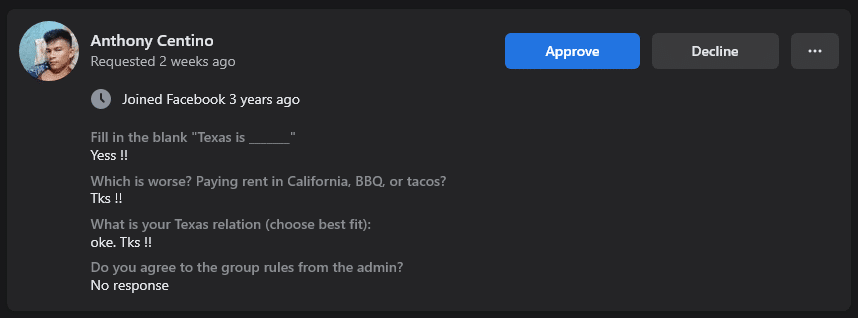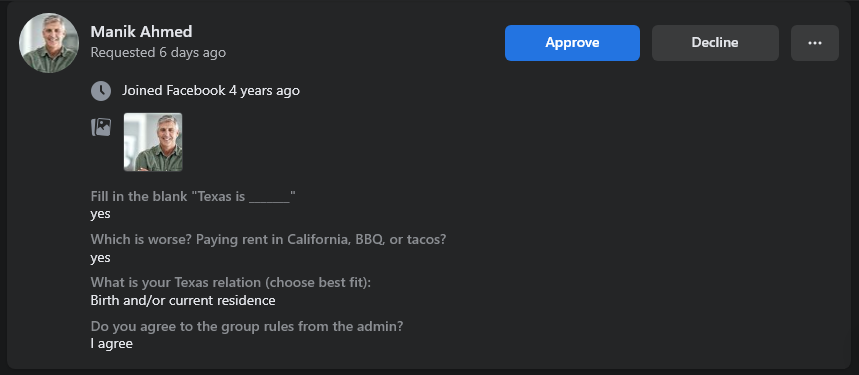When built, operated, and managed correctly Facebook Groups can be a major source of website traffic, word of mouth marketing, lead gen, and sales. Community management using Facebook Groups though is increasingly difficult as spammers figure out how to evade detection by the admins of a Group and of course thanks to Facebook themselves ruining public Groups by making them all globally public (previously you could limit who joined a public Group, read about the change here).
We build, admin, manage, and help moderate Facebook Groups with over a total of over 1,000,000 members. While spammers have always been a problem for Facebook Groups, they became considerably worse around late October of 2021 and the amount of spam requests we see appears to be escalating in early 2022 so far. I have a pretty long and solid track record of fighting spammers on Facebook having sniffed out dozens of operations by spammers and foreign political operatives since 2014 (except for one mistake in 2020 where I accidentally accused Patrick Mahomes mother of being a scammer stealing her identity but it turned out to actually be her… that was embarrassing).
We thought it would help other Group managers out there, social media marketers, and business owners trying to build their own Group on Facebook to understand what the spam requests to join or participate in a Facebook Group might look like.
To do this we allowed 2 Groups that we manage to build up requests, one of those is a Public Group and another is a Private Group. This will allow us to show the tricks spammers and possibly even those with more nefarious intent use to get access to your Group. All of the accounts shown below tried to join our Groups as spammers and most (if not all) are all removed from Facebook now.
Please note this is not a comprehensive list and my team and I will likely add on to it as time goes on.
List of 14 Ways to Tell if a Spammer is Trying to Join Your Facebook Group
1. The Facebook Account Just Recently Joined Facebook
One of the biggest red flags is that the person trying to join or participate in your Group recently made an account on Facebook. While this isn’t always the sign of a spammer, for example Facebook’s broken 2FA system locks out users all the time and many resort to making new accounts, most spammers and nests of spammers use this tactic since it is one of the easiest to deploy. Oftentimes if spammer nest has been hired on behalf of a company or a government entity they will create new fake accounts just for that client so they can easily show proof of activity with the names of the fake account for the marketing / disinformation campaign.
Take our spammer account “Emma Walton” below for example. When requesting to join our Group her account was 5-days old and she had already joined 6 Groups. Note her number of friends and her inability to formulate a response to the first memebership question as well.
2. The Account Name and Profile Photo are Mismatched
Some spammers have trouble creating fake accounts. Facebook does have an internal system designed to try and defeat as many fake account signups as possible. If you’ve ever removed or blocked a spammer you might have noticed Facebook and Instagram mention stopping future accounts ‘they might create’ which alludes to this internal system trying to detect fake accounts made by spammers, and when this happens spammers might opt to instead create a real account for themselves then make a few edits to make the account look like someone else their target victims might trust more.
Take our spammers “Javaed Khan” and “Jammal Molla” below for example. The account name might not conjure up thoughts of a Caucasian woman like we see in the photo. If you take a moment to look below you’ll see both Javead’s and Jamal’s likely real photos on their accounts. The the odd two photos and the name should make you stop and consider this join / participation request more carefully.
In this instance instead of declining someone’s request I would recommend seeing if you can take a deeper look at their profile by visiting their main FB profile or by looking for other red flags in their request (see the rest of this list). There are possible reasonable explanations for the mix match and the last thing you want to do as a community manager is decline someone based on their photo and name, but it is a known tactic used by spammers and so it has to be a consideration as you go through the steps of approving new members.
3. Account Spams the Membership Questions
You should always include at least one open-ended membership question for prospective members to answer. These are where the user has to type something. Spammers are by nature trying to get as much spam posted as quickly as possible to as many groups as possible across as many fake accounts as possible. That means they can hardly be bothered to write an actual answer to your questions, but some skip the middle step of joining and just spam the admins of the Group. If the goal is to post as much spam for real humans to see as possible and trying to write something to join the Group would only betray the spammer as an account that is not actually interested in joining, then why not spam the admin / moderators of a Group instead?
Take our spammer “Jammal Molla” below for example. He probably knew his attempts to join Groups would be figured out by admins and so instead of even trying to get accepted just decided to spam his message about Amazon job offers.
4. Account is a Member of Numerous Groups but Refuses to Answer Membership Questions or Accept Group Rules
Some spammers have a line of ethics they won’t cross, like for example lying about their intentions or breaking their word. This can be a powerful tool in the hands of a Facebook Group admin trying to keep their community free of spam or worse content.
Take our spammer “Hussin Gafar Hussain” below for example. He is in dozens of other Groups but refused to answer our membership questions or to accept our Group rules. This should be a pretty big red flag for any group moderator or admin reviewing this request and should ultimately end in a decline or a decline and block.
5. Refuses to Answer Membership Questions, Accepts Rules, is in Hundreds of Other Groups
Not all spammers attacking Facebook Groups have morals or ethics guiding their decisions, some of them just want to decieve you so they can spread their spam. Like other spammers these kind typically know that open-ended questions will trip them up and betray their actual intentions. In these cases the spammer will not answer any questions but will accept whatever you rules you claim to enforce, they are likely to also be in hundreds of other Facebook Groups where they spam.
Take our spammer “Jimmy Mann” below of example. Relatively new account, in over 500 other Facebook Groups, accepts the rules, but can’t really be bothered to answer the membership questions. The probability that Jimmy is a spammer is incredibly high and profiles like this should always get declined.
6. Only Replies “OK” to Your Open-Ended Membership Questions
To save time spammers like to try and speed run through membership requests to join as many Groups as possible during their work shift or before their fake account is burned by Facebook’s staff. One way they do this is simply replying with an affirmative, usually “ok” or a more emphatic “OK” to all open-ended membership questions.
Yes, some real users do this to because they can’t be bothered to care about your membership questions. In both cases I recommend declining the accounts requests to join. If they are a spammer they will just spam your Group, if they are a real user they are unlikely to participate in selfless ways.
7. Replies to Your Open-Ended Questions With “tks”, “thanks”, or “tks admin”
As we have discussed short answers to open-ended questions should be suspicious, but that goes double for short answers that thank you using the shortended version of thanks “tks” or the words fully spelled out. In many cases theses spam accounts will do less to cover their tracks than others for example they will openly admit to not be located in the geographic region your Group targets and they will sometimes even refuse to accept your rules after thanking you.
8. You Click to View Ther Profile and See a Message That Says “Sorry, this content isn’t available right now”
Sometimes the Facebook (or Meta) security team has already determined an account is a spammer and has deleted or deactivate the account. When this happens if you try and visit the user’s Group profile or main profile you should be greeted with the screen below that has a tool icon and the phrase “Sorry, this content isn’t available right now”. This is also a chance that the user has themselves deactivate their account, that their 2FA has broken and locked them out, or various other circumstances that can lead to this message appearing. When this happens I recommend simply declining the join request just in case the user is legitimate and might request again in the future.
9. The Account’s Answers to Membership Questions Do Not Line Up With Their Profile
Membership questions play a critical role in keeping spammers and ne’er-do-wells out of your Groups. We’ve already seen how spammers will avoid answering questions or will give super simple answers instead, but what happens when a spammer puts a little effort in and actually answers your questions? Well, the questions aren’t just a deterrent because they take up time and can quickly signal a spammer, but also because it gives you chance to catch a spammer slipping.
Take our spammer “Md Abdul Khalek” below. His profile claims he is from the city of Lubbock, TX but his answers to questions don’t quite line up the way someone from Lubbock might actually answer. This of course makes the account suspicious but doesn’t mean it will be a spammer. Now, Lubbock is home to a major university and as such has students from all over the world attending, some of which may not speak or read English the greatest. Out of an abundance of caution we decided to actually accept Mr. Khalek into the group to avoid making him feel unwelcome if he did just move to Texas for college. He promptly spammed our Group about a scam and we removed him from the Group and blocked his future attempts. In cases like this one where the mismatch might be easily explained we always try and side with the account oftentimes simply accepting them, declining, or declining with a feedback message asking them to try again. The empathetic among us might think a good chunk of these would become successful group members, but they would be sadly mistaken. So far 100% of accounts with a mismatch between what we can see of their profile and answers to their membership questions have been spammers. We give each of these that second chance to ensure a real interested users isn’t blocked from a Group they might become an excellent member of.
Edit: As pointed out below in the comments by user “finance_tony” you can accept someone in a case like this and immediately turn on post approval for the user. Facebook’s system will turn this off after a month, giving you plenty of time to guage the posts a user makes and determining if they are a spammer or a good group member.
10. Answers Your Membership Questions With the Name of Your Group
As we’vd discussed spammers are in a hurry joining a lot of Groups as quickly as possible to spread their spam. The one thing that seems to slow them down the most is answering questions. Since all Groups have different questions and most use questions unique to the Group, this makes it hard for a spammer to quickly answer questions and move to the next Group to join. One tactic we have spotted fake accounts / spammers using lately is to simply paste the name or part of the name of a Group into the answer field of one or more membership questions.
The Group we are looking at here is the “Texas is Life Group” we use for testing. Texans genuinely looking to connect with other Texans will use this prompt to tell you what Texas is to them. Some spammers realize it is part of the Group name and hastily paste it in before moving on.
11. The Account Promises They Won’t Spam and Says Your Group is Their Happiness While Answering an Unrelated Membership Question
Some spammers like to take a different route from those who think they can fake out admins by simply not answer questions or answer them with short words like “tks”. These spammers post actual answers to your questions, except the answers rarely actually answer your questions. The most prevalent is an answer that says “Being a member of group is my happiness. I promise there’re no ads and spam” or perhaps a more grammatically correct version of this.
What should catch your eye immediately here is that the spammer says this to a completely unrelated question. You might think they simply made a mistake, but they did not. This message is used hundreds of times per day to try and join or participate in Groups we manage and they are spammers 100% of the time. Always decline these requests and block.
12. The Account Says They Want to Join the Group to Improve Their Knowledge While Answering an Unrelated Membership Question
Most Facebook Group admins and moderators love that their volunteer work helps others learn and grow. This is something spammers seek to exploit by assuring you in their membership answer questions that they only want to join a Group to “improve my knowledge”.
Of course you can’t immediately discount anyone who says they want to join to increase their knowledge but the example below is something we see dozens of times per day and is used by spammers trying to trick you into letting them join so they can spam your users later.
13. Enthusiastically Gives Short Answers to Your Membership Questions but Does Not Accept Group Rules
Two exclamation marks in copy of any kind is always a red flag, but when it comes to someone trying to join a Facebook Group it typically means they are here to spam and hope their usage of exclamation marks makes you so excited they want to join that you ignore the obvious signs they are a spam account trying to abuse your Group.
14. Answers “Yes” to All or Most Membership Questions
Yet another trick spammers try to use to avoid your security is to just answer yes to everything. Some Group admins do not use membership questions that are too complicated but instead require only yes/no answers. Spammers will use some of their fake accounts to just answer yes to most or all membership questions they get asked knowing they will have some luck and get into some Groups.
Need help with your Facebook Group? Managing your Page? Running your Facebook Ads campaigns? Tell our team of experts how you want to grow your business with Facebook and find out if we are the right fit for your needs.

